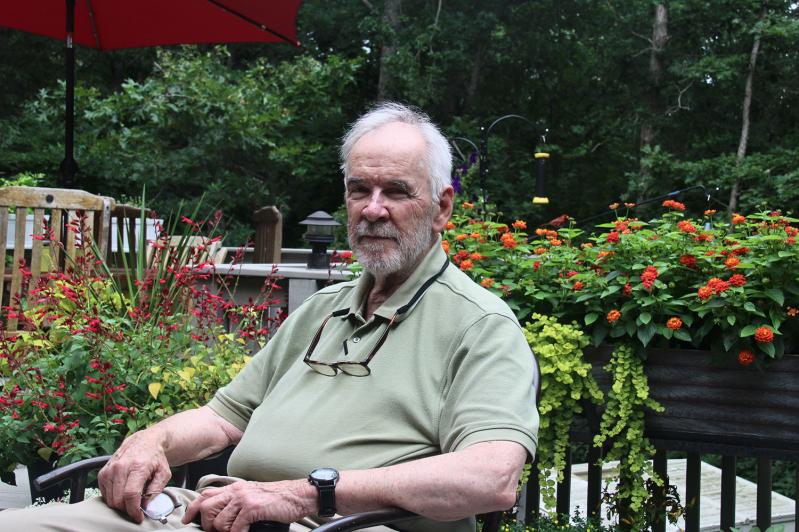Sometimes Anthony Brandt is ready to write a poem and sometimes he is not. The muse can whisper in his ear or sit next to him and he is suddenly writing, even if it's on a napkin in the parking lot of a Target store while waiting for his wife, Lorraine Dusky, to finish picking up a couple of things.
"There is something that is not entirely you. It's about the muse. I know it's weird to talk about a muse, but I'm absolutely convinced the muse is real," Mr. Brandt said on a recent summer afternoon, sitting on his backyard deck in Sag Harbor as hummingbirds fed in the tall, potted salvia and bushy cigar plants. "And by God, you better pay attention. These are gifts."
Mr. Brandt, 83, is a prolific writer and editor whose magazine articles and book reviews have appeared in many publications, including GQ, Men's Journal, Esquire, and The Atlantic. Boulevard, Prairie Schooner, and TLS (formerly the Times Literary Supplement), among others, paid him $7 or $8 for his poems, and a collection of his poetry, "The Fast," was published in 2016.
He is also the author of the book "Reality Police: The Experience of Insanity in America," based on his experiences pretending to be ill in order to see what a state-run mental hospital in Poughkeepsie was like on the inside, as well as the book "The Man Who Ate His Boots: The Tragic History of the Search for the Northwest Passage." He also wrote the introduction to a series of historical adventure books, including "The South Pole: A Narrative History of the Exploration of Antarctica."
As his journalism career was picking up, he put poetry aside. "I could make $2,000 writing magazine pieces," he said. "I think the spirit left me or I didn't need to do it anymore."
But then the universe seemed to intervene, which is to say, magazines began folding or slowly pulling back on well-paying assignments, and he returned to the craft of poetry. Writing at a messy desk lit by two lamps, "with bugs bouncing loudly off the windows," he again trusted the muse and went with it. Now, after about three and a half years, he is releasing a second volume of poetry, titled "The Only Available Word."
The cover, designed by his niece Sasha Dusky, a graphic designer in San Francisco, includes a long-ago photograph by the late Ken Robbins that featured Mr. Brandt himself walking his dog. The collection has endorsements coming in the form of cover blurbs by well-known creative types: Judy Collins, Audrey Flack, and Jules Feiffer.
"A poet of the ordinary and the sublime, Anthony Brandt's poems have lifted me from the darkest hours. They soothe my soul with their transcendent beauty, and sometimes even make me smile," writes Ms. Flack, who even incorporated one of them into one of her paintings.
"The Only Available Word" will be available for purchase on Amazon starting today.
Some of the poems are inspired by the nature preserve behind his house. In the summer it is lush with life, and in the winter you can see Rattlesnake Creek flowing between the leafless trees. "But I doubt there's been a rattlesnake in Suffolk in 100 years," he said.
One of his favorite poems in the new collection is "Listening to Mozart":
Flesh and spirit, welded into one —
it is a paradox
beyond explaining. The one melts,
the other steals off
the way salt dissolves in water, leaving
only its taste behind. . . .
So we live on,
and melancholy is our music. But tenor voices
against all reason dip
into it and lift it into the heavens, into
the paradox of praise.
Over the last several months Mr. Brandt has been posting his poems a couple of times a week on Facebook, whetting the literary appetites of friends and contacts who, based on their responses, are eager to see more of his recent work.
"I love to share them," he said, "and I look forward to the day when I can do readings again. I love to read."
His voice is deep and wise, easy to listen to. For many years that voice could be heard at the dais of the municipal meeting room in Sag Harbor Village Hall, during meetings of the Board of Historic Preservation and Architectural Review, of which he was the founding chairman. And that recent afternoon on the deck, he shuffled through a printed copy of the manuscript, held together by a folder labeled "Bay Street Theater," searching for the right one to read to a visitor.
He settled on "Swarm," which references the aforementioned bugs:
. . . What is it they seek?
Enlightenment? They make
me uneasy. They aim well
but they do not mean well. . . .
There are times when Mr. Brandt finds himself staring at an empty sheet of paper at his desk, but the muse feeds him a line or two, maybe a couple of gentle twists or turns, and suddenly, there's a poem there.
"A lot of it is beyond explaining," he said. "That's why poets use the idea of having a muse, because they can't explain it themselves."
This story has been updated to correct the location of the hospital Mr. Brandt wrote about, and to clarify his role in a series of historical adventure books.




